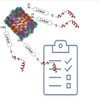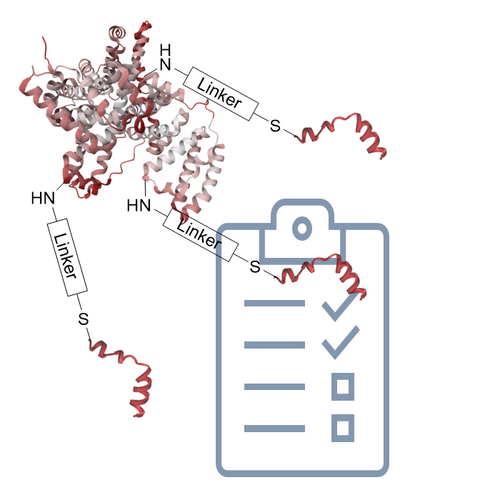Product Description
Keyhole limpet hemocyanin (KLH) is used extensively as a carrier protein for antibody production. KLH is a large, oxygen-carrying, multi-subunit protein that contains chelated copper of non-heme origin. This routine synthesis service is designed for the small-scale preparation of purified and characterized KLH–peptide conjugates with multiple peptides per KLH molecule. These multi-peptide–loaded KLH conjugates are suitable for immunization applications and provide reliable performance.
Customers may either provide a Cys-containing peptide to CellMosaic or request CellMosaic to purchase the peptide if the sequence is provided. CellMosaic delivers the final conjugate along with reversed-phase and SEC-HPLC analysis data.
Customers can order online by providing peptide information and selecting any additional optional services.
What's included in the Base Price:
- Labor and materials (excluding Cys peptide; see Cys peptide requirements in the section below).
- Initial QC and quantitation of the starting peptide by reversed-phase C18 HPLC to confirm purity.
- In-process monitoring of KLH and peptide conjugation.
- Filtration and/or cartridge-type purification to remove the majority of unreacted peptides
- Final conjugate analysis by reversed-phase and SEC-HPLC to determine purity, concentration, and residual peptide.
- Use of sterilized buffers and plasticware throughout preparation.
Delivery: Final product is supplied as a solution in one tube and stored at 2–8 °C, along with a COA that includes reversed-phase and SEC-HPLC data, concentration, and peptide loading.
Timeline: Approximately 2-3 weeks after receiving the starting peptide.
Peptide Loading: Expected to be in the range of 5–80 peptides per KLH for immunization (aiming for the highest loading without significant precipitation). Small peptides may achieve higher loading, while long or highly hydrophobic peptides usually result in lower-than-expected loading and are often supplied as low-loading even when high loading is requested.
Selections and Add-Ons:
1. Reaction Scale: Choose between 5 mg and 10 mg KLH labeling scale. Typical recovery is 30–70%, depending on peptide properties. If you do not see the desired scale, please contact us for a custom quote.
2. Peptide Molecular Weight (MW):Choose between low (<3,000 Da), Medium (3,000–5,000 Da), and high (5,000–10,000 Da) molecular weight to ensure appropriate handling and reaction conditions. If you have a mini-protein or a peptide >10 kDa, please contact us for a quote.
3. Optional 0.2 µm Sterile Filtration: Routine preparation at CellMosaic uses sterilized buffers and pyrogen-free consumables. The final purified product is suitable for in vitro and in vivo studies. However, customers may request additional 0.2 µm sterile filtration after purification (note: this step may slightly reduce the final yield).
Requirements for Cys Peptide:
- Type: Standard peptide containing a reactive cysteine at either the N-terminus or C-terminus. If your peptide contains additional modifications, please contact us for a quote.
- Purity: HPLC-purified and lyophilized with ≥90% unoxidized Cys-peptide content by C18-HPLC. No additional components containing thiol groups (e.g. DTT) should be present.
- Amount:
-
5 mg KLH labeling → 3 µmol (measured by weight). Unused materials can be returned upon request.
-
10 mg KLH labeling → 6 µmol (Measured by weight). Unused materials can be returned upon request.
-
- Information: Provide as much detail as possible — amount, molecular weight, sequence, extinction coefficient — and attach QC and SDS data from your peptide vendor. Sequence information is required if CellMosaic is to order the peptide. The peptide should be non-toxic and non-hazardous to be ordered online. For toxic or highly toxic peptide conjugation, please contact us for a custom quote.










